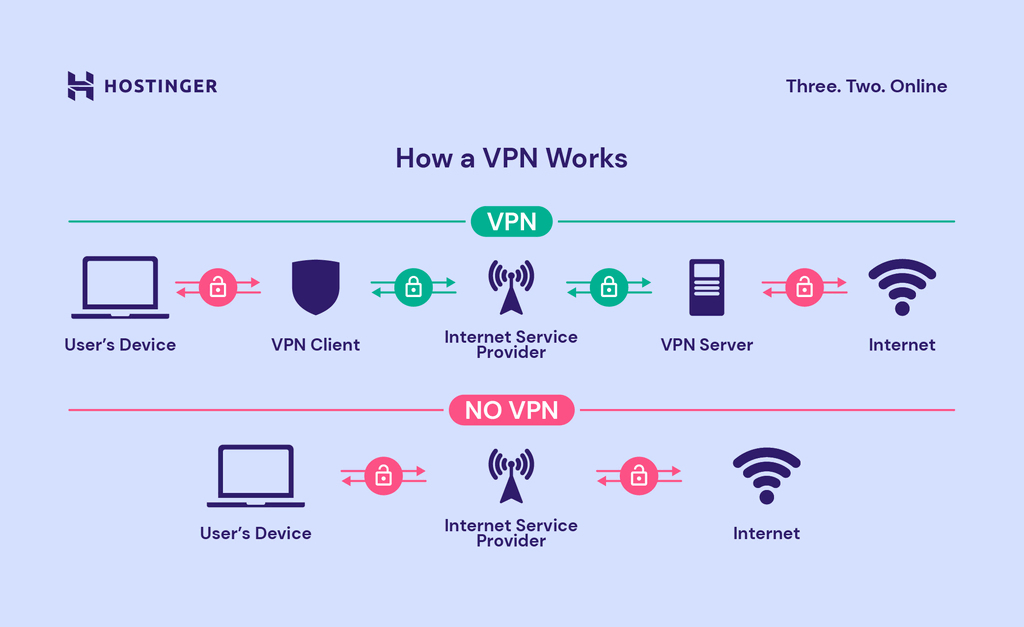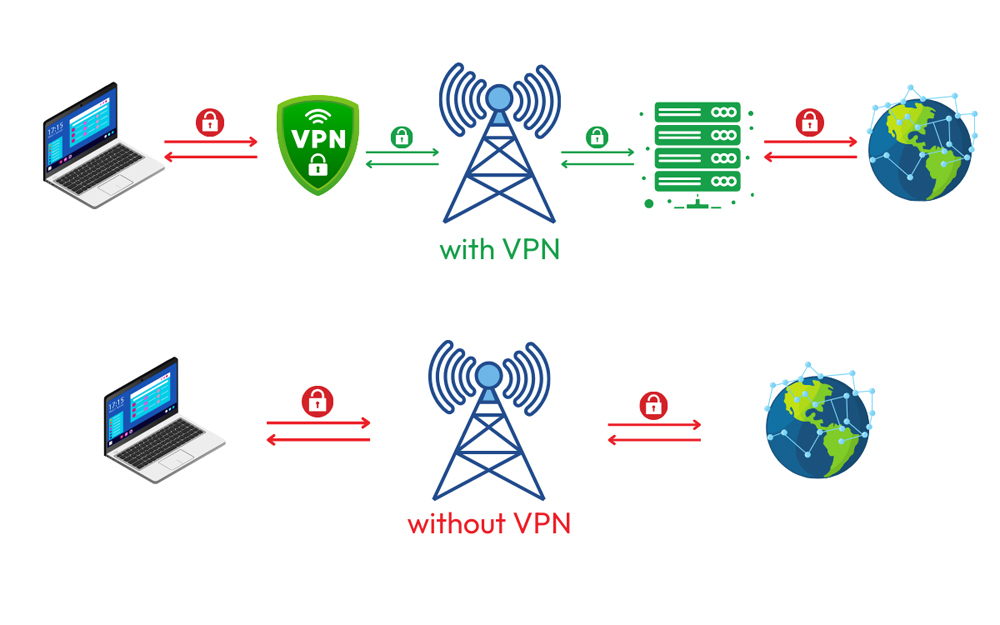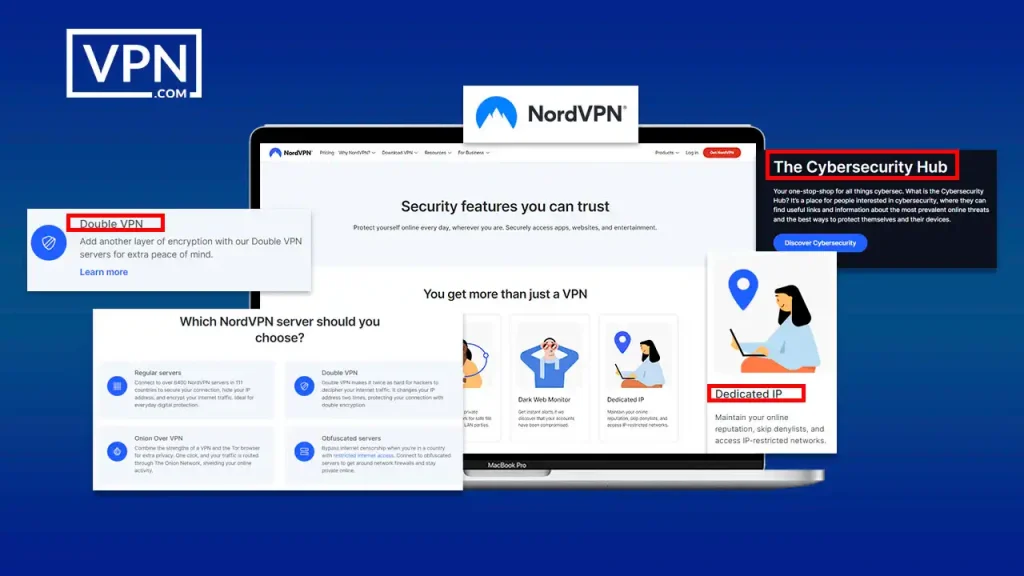A VPN, or Virtual Private Network, secures your internet connection. It hides your IP address and encrypts your data.
This ensures privacy and protection online. In today’s digital world, online security is crucial. You may have heard about VPNs but might not know how they work. A VPN creates a private network from a public internet connection. This makes your online actions almost untraceable.
It protects your data from hackers and secures your privacy. Whether you are using public Wi-Fi or want to access region-locked content, a VPN can help. Understanding how a VPN works can greatly enhance your online experience and security. Let’s dive deeper into the world of VPNs and discover how they can benefit you.

Credit: www.avast.com
How Vpns Work
Understanding how VPNs work can seem complex, but it’s quite simple. VPNs, or Virtual Private Networks, protect your online activities. They do this by making your connection private and secure. This process involves encryption and tunneling protocols.
Encryption Process
Encryption is the first step in a VPN’s process. It scrambles your data into unreadable code. Only your VPN server and your device can decode this information. This means hackers and snoopers can’t see your data.
Encryption uses complex algorithms. These algorithms make your data secure. The most common encryption method is AES-256. It is strong and widely trusted. Your data becomes safe from prying eyes.
Tunneling Protocols
Tunneling protocols create a secure path for your data. This path, or tunnel, keeps your data safe as it travels. Common tunneling protocols include OpenVPN, L2TP/IPsec, and IKEv2.
OpenVPN is popular for its balance of speed and security. L2TP/IPsec adds an extra layer of encryption. IKEv2 is known for its fast connection speeds. Each protocol has its strengths. They all ensure your data is safe during transit.
VPNs use these protocols to keep your connection private. Your data moves through these secure tunnels. It stays hidden from anyone trying to monitor your activity. This is how VPNs protect your online privacy.
Types Of Vpns
Understanding the different types of VPNs is essential for choosing the right one for your needs. VPNs come in various forms, each designed to cater to specific requirements and scenarios. Let’s explore the two most common types: Remote Access VPN and Site-to-Site VPN.
Remote Access Vpn
A Remote Access VPN allows individual users to connect to a private network from a remote location. This type of VPN is ideal for people who work from home. It offers secure access to company resources. Employees can connect to the office network safely. This ensures that sensitive data remains protected, even when accessed from afar. With a Remote Access VPN, users can work securely, no matter where they are.
Site-to-site Vpn
A Site-to-Site VPN connects entire networks. This type is often used by businesses with multiple locations. It links the networks of different offices. Each office can communicate and share resources securely. The data travels through an encrypted tunnel. This ensures that all communications remain private and secure. Site-to-site VPNs are essential for businesses looking to maintain secure connections across various locations.
Benefits Of Using A Vpn
Using a VPN offers numerous benefits that enhance your online experience. VPNs are not just for tech-savvy individuals. They are also vital for anyone who values security and privacy. Let’s explore how a VPN can benefit you.
Enhanced Security
A VPN provides enhanced security for your online activities. It encrypts your internet connection. This makes it difficult for hackers to intercept your data. Whether you are using public Wi-Fi or your home network, a VPN keeps you safe.
| Without VPN | With VPN |
|---|---|
| Data is unencrypted. | Data is encrypted. |
| High risk of hacking. | Low risk of hacking. |
Privacy Protection
Privacy is a major concern for many internet users. A VPN masks your IP address. This hides your location and browsing activities from prying eyes. This is crucial in today’s digital age.
- Your ISP cannot track your online behavior.
- Websites cannot identify your real location.
- Advertisers cannot build a profile based on your browsing habits.
By using a VPN, you gain a higher level of privacy protection. This is important for maintaining your anonymity online.
Common Uses Of Vpns
VPNs, or Virtual Private Networks, have become an essential tool for many internet users. They offer a range of benefits, enhancing privacy and security online. Here, we explore some common uses of VPNs.
Accessing Geo-restricted Content
Many streaming services and websites restrict content based on your location. A VPN allows you to bypass these restrictions. By connecting to a server in another country, you can access content as if you were there.
For example, you might want to watch a show available only in the US. Using a VPN, you can connect to a US server. This makes the service think you are in the US, giving you access to the show.
Benefits:
- Access to a wider range of content
- Enjoy region-specific services
- Stay updated with global news and events
Safe Online Shopping
Online shopping can expose your personal information to hackers. A VPN encrypts your internet connection, making it much harder for cybercriminals to steal your data.
When shopping online, especially on public Wi-Fi, your data is vulnerable. A VPN protects your credit card details, home address, and other sensitive information.
Advantages:
- Secure transactions
- Protects personal information
- Safe browsing on public networks
| VPN Use | Benefit |
|---|---|
| Accessing Geo-Restricted Content | A wider range of content, region-specific services |
| Safe Online Shopping | Secure transactions, protect personal information |
Using a VPN provides numerous benefits, from accessing content to protecting your data. Whether streaming shows or shopping online, a VPN enhances your online experience.
Potential Drawbacks
While VPNs offer many benefits, they also come with some potential drawbacks. It’s important to understand these downsides to make an informed decision. Let’s explore some of the common issues users face.
Speed Reduction
One common drawback is a reduction in internet speed. VPNs route your data through remote servers. This extra step can slow down your connection. High-quality VPNs minimize this impact. But, some speed loss is often inevitable.
Possible Disconnections
Another issue can be unexpected disconnections. VPNs can occasionally drop their connection. When this happens, your data may no longer be secure. A reliable VPN should reconnect quickly. But, brief lapses in security can still occur.

Credit: www.hostinger.com
Choosing The Right Vpn
Choosing the right VPN can seem overwhelming with so many options. Whether you need a VPN for browsing, streaming, or security, it is important to understand your needs. Let’s explore the key factors to consider when selecting a VPN.
Free Vs. Paid Vpns
Free VPNs attract users with their zero-cost promise. They are good for light browsing and basic tasks. But they often come with limitations. These include slower speeds, data caps, and fewer server options.
Paid VPNs, on the other hand, offer more features and better performance. They provide faster speeds, unlimited data, and a wide range of servers. They also offer stronger security measures. For heavy users and those valuing privacy, a paid VPN is often worth the investment.
Key Features To Look For
Consider the encryption protocols used by the VPN. Strong encryption ensures your data remains secure. Look for AES-256 encryption, which is a strong standard.
Check the server locations. More servers mean better chances of finding a fast connection. It also allows access to content from different regions.
Ensure the VPN has a no-log policy. This means they do not keep records of your online activities. This is important for privacy.
Look for additional features like a kill switch, split tunneling, and DNS leak protection. These features enhance your safety and browsing experience.
Consider the ease of use. A user-friendly interface makes the VPN simple to navigate. This is crucial for non-tech-savvy users.
Finally, check for customer support. Good support can help solve any issues you face. Look for live chat support for quick assistance.
Setting Up A Vpn
A VPN, or Virtual Private Network, secures your internet connection. It hides your IP address, making online activities private. Setting up a VPN is simple and enhances your online security.
Setting up a VPN might seem complicated. But with the right steps, it becomes easy. You can protect your privacy and secure your data. Follow these simple steps to get started.
Installation Steps
First, choose a VPN service. Many options are available online. Download the VPN app from the official website. Ensure it is compatible with your device. Open the app and follow the on-screen instructions. You might need to create an account. Some VPNs offer a free trial. Test the service before committing.
Configuration Tips
After installation, configure your VPN settings. Select a server location. Choose a server close to your actual location. This ensures better speed. Enable the kill switch feature. This protects your data if the VPN connection drops. Adjust the protocol settings. Some VPNs offer multiple protocol options. Select the one that balances speed and security. Remember to save your settings. Now, connect to the VPN server. Check if your IP address has changed. Visit a site like “whatismyip.com”. If the IP is different, your VPN works correctly. Setting up a VPN is straightforward. Follow these steps for a secure online experience. “`

Credit: www.esecurityplanet.com
Future Of Vpn Technology
The future of VPN technology looks promising. As digital landscapes evolve, VPNs must adapt. This evolution brings new trends and technologies. Let’s explore some of these exciting developments.
Emerging Trends
VPN technology is always advancing. One key trend is the use of AI and machine learning. These technologies help detect and prevent threats. They also optimize network performance.
Another trend is the rise of zero-trust security models. This approach assumes that no one is trustworthy by default. It requires continuous verification of user identities. This enhances security for remote workers.
Quantum computing is also on the horizon. It promises faster data processing. VPNs must evolve to ensure encryption remains strong.
Impact Of 5g
The rollout of 5G networks is transforming VPN technology. 5G offers higher speeds and lower latency. This improves the user experience significantly.
With 5G, more devices can connect simultaneously. This is crucial for the Internet of Things (IoT). VPNs will need to handle increased traffic securely. They must also protect a wider range of devices.
The advent of 5G also means more data being transmitted. This requires stronger encryption methods. VPNs must stay ahead to ensure data remains secure.
Overall, the future of VPN technology is bright. Emerging trends and 5G will shape it in exciting ways.
Frequently Asked Questions
What Is A Vpn Used For?
A VPN is used for online privacy and security. It hides your IP address and encrypts your internet connection. This protects your data from hackers and prying eyes. It also allows access to geo-restricted content.
How Does A Vpn Protect Data?
A VPN protects data by encrypting your internet connection. This makes your online activities private and secure. It prevents hackers and third parties from intercepting your data. It also hides your real IP address.
Can A VPN Be Used On Multiple Devices?
Yes, a VPN can be used on multiple devices. Most VPN providers allow several simultaneous connections. This includes smartphones, tablets, laptops, and desktops. You can protect all your devices with one VPN account.
Do VPNS Affect Internet Speed?
VPNs can affect internet speed. Encryption and server distance can slow down your connection. However, premium VPNs minimize speed loss. They use high-speed servers and optimize performance. Your internet speed may slightly decrease but remain usable.
Conclusion
A VPN enhances online privacy and security. It hides your IP address. This keeps your data safe from hackers. VPNs also allow access to restricted content. They are easy to use and set up. Many services offer affordable plans. Always choose a reliable provider.
Stay safe and private online. Using a VPN is a smart choice. It ensures your internet activities remain confidential. Enjoy a safer browsing experience today.




